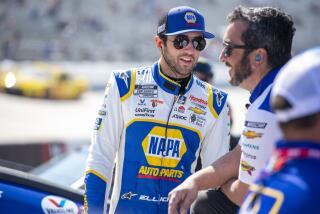Licensed to Thrill
INDIANAPOLIS — We have Tiger and A-Rod and we’re about to get Michael back, but the rest of the world has Schumi.
Michael Schumacher, known as Schumi to his millions of fans worldwide, is the driver of the red No. 1 Ferrari in Formula One--and with a salary said to be about $40 million and total earnings last year of $99 million, is the highest-paid athlete in the world.
He may also be the best.
Schumacher, 32, clinched his fourth F1 Grand Prix championship three races ago, in Hungary. Two races ago, in Belgium, he won his 52nd career race, moving ahead of Alain Prost as the all-time F1 winner.
Only the legendary Juan Manuel Fangio, with five, has won more championships.
For the 10th time in 16 races this year, Schumacher took the pole for today’s SAP United States Grand Prix. He had a track-record lap of 130.669 mph.
After waiting for 23 minutes of the hour qualifying session before taking the track, Schumacher was out for only nine laps. No one else took fewer than 11.
When Schumacher rolled the red car out of the trackside garage, the crowd of about 70,000 roared its approval when they caught their first glimpse. Nothing like that has happened here since the 1970s when A.J. Foyt would come walking onto pit lane.
Schumacher wasn’t out there long, but he gave the crowd what it wanted.
If he can win today, as he did here last year, and he can win the season finale in Japan, as he did last year, his 10 wins would be the single-season record.
“The way Michael is driving, I can’t see anyone stopping him,” said Nigel Mansell, who shares the record of nine with Schumacher. “He’s a fantastic racer and a great bloke. Records are there to be broken and he deserves all the success he can get.”
Not everyone thinks of the somewhat aloof German as a “great bloke.” Heard more often is “arrogant.”
That perception stems from his limitless self-confidence and a discipline that leaves him little time for anything but racing and family. He credits the discipline, which he displayed in his teens when he was racing on the German junior kart circuit, with much of his success.
“A lot of discipline, discipline in training, in work on the car, belief in development, on the human side as well as the technical side, is what it takes to succeed,” he told Reuters.
“I am lucky that I have most of those ingredients to be successful and I know you have to be disciplined enough to keep on working. And, of course, you must never give up.”
That self-confidence, or arrogance if you will, has led to trouble at times. Early in his career, he displayed the attitude that the track belonged to him, that his racing line was inviolate.
In 1994, he led Britain’s Damon Hill going into the final race at Adelaide, Australia. When the two crashed at Adelaide, knocking both out of the race, Schumacher had his first championship for the Benetton-Ford team by a single point.
Three years later, in Jerez, Spain, a similar situation arose with Canada’s Jacques Villeneuve the challenger needing to finish ahead of Schumacher to win the title. This time, Schumacher was accused of deliberately ramming Villeneuve’s car so he would be assured of another championship.
The plan backfired when Schumacher was sidelined only to watch Villeneuve come back and finish third, taking the 1997 title away from the German. The FIA, world’s motor sport ruling body, responded by taking away Schumacher’s second-place finish in the F1 standings and ordering him to take part in a “safe-driving campaign” the following year.
Even though he was a national icon in his native Germany, it wasn’t until he left Benetton for Ferrari in 1996 and last year won them their first world championship since 1979 that his popularity spread worldwide. Ferrari may be an Italian marque, but the Prancing Horse of Modena transcends nationalism. It is a universal rallying point for Formula One addicts.
After the terrorist tragedy of Sept. 11, Schumacher was given the option of not running here and in Japan. He already had won the world championship and at the time no one could predict what might happen next.
“It’s quite true that Ferrari, even in Monza [Sept. 16], was very open and said if I feel it’s not the right time to race, they would leave the decision with me what to do,” Schumacher said Saturday. “And I thought that was very fair from the team to both drivers, honestly.
“On the other side, I never really had a doubt if things would improve and sort of come back to normal life. ... That’s why I’m here. I mean, I’m a racing driver, I intend to race for some more years and I want to give obviously the best. ... If things would have become difficult or war would have started, then probably none of us would have liked to see a race here.”
Although not completely enamored of Indy’s 2.606-mile road course, Schumacher enjoys coming to the United States. Unlike in Europe, where he can’t go shopping or eat in a restaurant without being swarmed, few people recognize him here.
Schumacher echoes the sentiments of nearly all of the 22 drivers in today’s race when he calls the track “not the greatest challenge,” adding that “basically the problem here is that you have an oval which you adapted to and now we have a circuit where it is always a compromise at the end of the day.”
On the other hand, he has no desire to come back and drive in the Indy 500, as so many world champions have done.
“I have never really looked into racing [the 500] because I simply don’t see a point in it. There’s two reasons for this. First, I feel it is too dangerous from my point of view. And second, I feel Formula One is the highest challenge you can have in motor racing. So, obviously, I’m doing well here and I don’t see I need to prove anything.”
U.S. Grand Prix
FORMULA ONE
WHEN: Today (Channel 7, 10:30 a.m.)
WHERE: Indianapolis Motor Speedway (road course, 2.606 miles, 13 turns).
More to Read
Go beyond the scoreboard
Get the latest on L.A.'s teams in the daily Sports Report newsletter.
You may occasionally receive promotional content from the Los Angeles Times.










